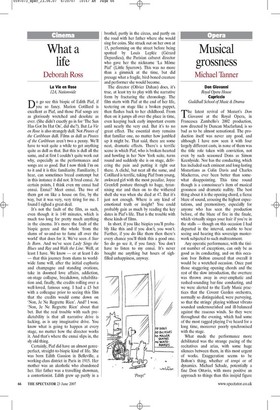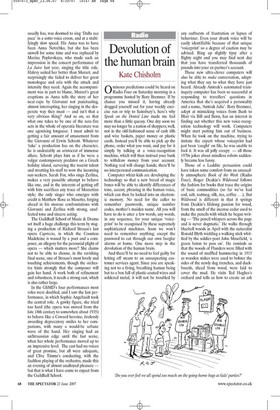Musical grossness
Michael Tanner Don Giovanni Royal Opera House Capriccio Guildhall School of Music & Drama The latest revival of Mozart's Don Giovanni at the Royal Opera, in Francesca Zambello's 2002 production, now directed by Duncan Macfarland, is so bad as to be almost sensational. The production itself was never any good, and although I have now seen it with four largely different casts, in none of them was the title role taken with conviction, not even by such seasoned Dons as Simon Keenlyside. Nor has the conducting, which has included such eminent and long-lasting Mozartians as Cohn Davis and Charles Mackerras, ever been better than somewhat disappointing. This time round though is a connoisseur's item of musical grossness and dramatic nullity. The best thing about it is the opening chord, a fierce blaze of sound, arousing the highest expectations, and premonitory, especially for anyone who has seen the production before, of the blaze of fire in the finale, which virtually singes your hair if you're in the stalls — though on this occasion I had departed in the interval, unable to bear seeing and hearing this sovereign masterwork subjected to such maltreatment.
Any operatic performance, with the tiniest number of exceptions, can only be as good as its conducting, and on this occasion Ivor Bolton ensured that overall it would be a wretched occasion. Once past those staggering opening chords and the rest of the slow introduction, the overture was thrown away in over-emphatic and rushed-sounding bar-line conducting, and we were alerted to the Early Music practices that the Covent Garden orchestra, normally so distinguished, were purveying, so that the strings' playing without vibrato sounded undernourished and ill-balanced against the raucous winds. So they were throughout the evening, which had some of the most ragged playing I've heard for a long time, moreover poorly synchronised with the stage.
What made the performance more debilitated was the strange pacing of the recitatives and arias, with some huge silences between them, in this most urgent of works. Exaggeration seems to be Bolton's thing, whether of tempi or of dynamics. Michael Schade, potentially a fine Don Ottavio, with more positive an approach to things than this insipid figure usually has, was doomed to sing `Dalla sua pace' in a sotto voice croon, and at a stultifyingly slow speed. His Anna was to have been Anna Netrebko, but she has been unwell for some time and was replaced by Marina Poplavskaya, who made such an impression in the concert performance of La Juive last year, singing the title role. Halevy suited her better than Mozart, and surprisingly she failed to deliver her great monologue and aria with the attack and intensity they need. Again the accompaniment was in part to blame, Mozart's great eruptions as Anna tells the story of her near-rape by Giovanni not punctuating, almost interrupting, her singing in the desperate way they must — and isn't that a very obvious thing? And so on, so that what one takes to be one of the sure-fire acts in the whole of operatic literature was one agonising longueur. I must admit to getting a fair amount of amusement from the Giovanni of Erwin Schrott. Whatever 'take' a production has on the character, he is undeniably an aristocrat of immense allure. Schrott plays him as if he were a vulgar contemporary predator on a Greek holiday island, surveying the tourist talent and strutting his stuff to wow the incoming sun-seekers. Sarah Fox, who sings Zerlina, makes a very passable attempt to behave like one, and in the interests of getting off with him sacrifices any trace of Mozartian style; the only singer who emerges with credit is Matthew Rose as Masetto, forging ahead in his morose confrontations with Giovanni and Zerlina with strong, unaffected tone and sincere acting.
The Guildhall School of Music & Drama set itself a huge challenge this term by staging a production of Richard Strauss's last opera Capriccio, in which the Countess Madeleine is wooed by a poet and a composer, an allegory for the perennial plight of opera — which matters more? She claims not to be able to choose, in the ravishing final scene, one of Strauss's most lovely and touching achievements, though the orchestra hints strongly that the composer will gain her hand. A work both of refinement and robustness, it needs a strong cast, which is also rather large.
In the GSMD's four performances most roles were doubled, and I saw the last performance, in which Sophie Angebault took the central role. A gawky figure, she tried too hard (the opera was moved from the late 18th century to somewhen about 1935) to behave like a Coward heroine, tirelessly awarding deprecatory smiles to her companions, with many a would-be urbane wave of the hand. Her singing had an unStraussian edge until the last scene, when her whole performance moved up to an impressive level. The cast had no voices of great promise, but all were adequate, and Clive Timms's conducting, with the faultless playing of the orchestra, made this an evening of almost unalloyed pleasure — but that is what I have come to expect from the Guildhall School.






























































 Previous page
Previous page